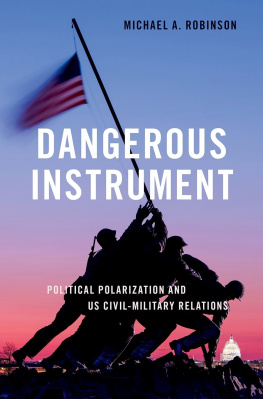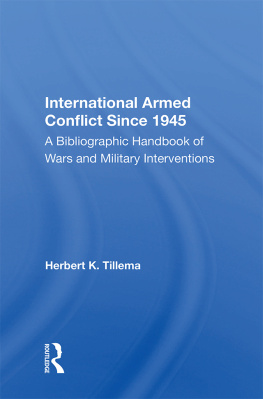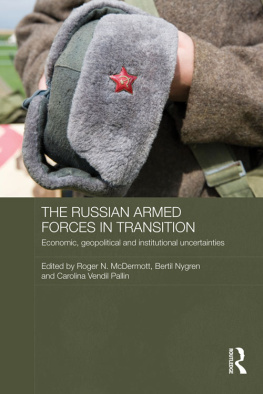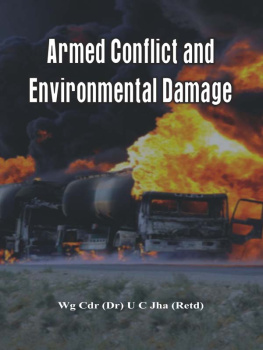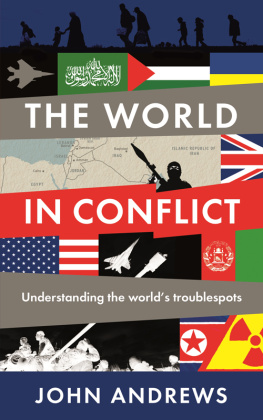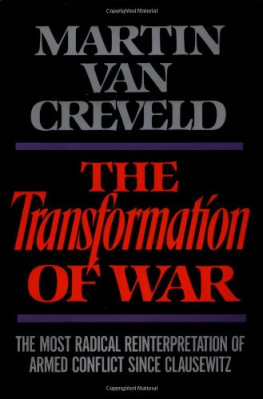First Published in Russia by
Vladar Publishing House, Moscow, 1995
First English Edition Published in 1998
in Great Britain by
Routledge
2 Park Square, Milton Park, Abingdon, Oxon, 0X14 4RN 270 Madison Ave, New York NY 10016
Transferred to Digital Printing 2007
Website http://www.routledge.com
Copyright 1998 M. A. Gareev
English Translation 1998 Yakov Vladimirovich Fomenko
British Library Cataloguing in Publication Data:
Gareev, Makhmut Akhmetovich
If war comes tomorrow? : the contours of future armed
conflict. (Cass series on Soviet (Russian) military theory and
practice; no. 7)
1. Military art and science 2. Military policy
I. Title
355.03
ISBN 0-7146-4801-9 (cloth) 0-7146-4368-8 (paper)
Library of Congress Cataloging-in-Publication Data
Gareev, M. A. (Makhmut Akhmetovich)
[Esli zavtra voina? English]
If war comes tomorrow? : the contours of future armed conflict /
Makhmut Akhmetovich Gareev ; translated by Yakov Vladimirovich
Fomenko ; with an introduction by Jacob W. Kipp.
p. cm. (Cass series on Soviet (Russian) military theory and practice)
Includes index.
ISBN 0-7146-4801-9. ISBN 0-7146-4368 8 (pbk.)
ISBN 9781135223090 (ePub)
1. World War III. 2. Military art and scienceForecasting.
3. International relations. 4. Military historyPhilosophy.
I. Title. II. Series.
U21.2.G36513 1998 |
355.48dc21 | 97-32218 |
CIP |
All rights reserved. No part of this publication may be reproduced, stored in a retrieval system or transmitted in any form or by any means, electronic, mechanical, photocopying, recording or otherwise, without the prior permission of Routledge
Typeset by Vitaset, Paddock Wood, Kent
Publishers Note
The publisher has gone to great lengths to ensure the quality of this reprint but points out that some imperfections in the original may be apparent
There is no lack of accusation that the military are preparing for the last war. This catch-phrase, by the way, was coined by a well-known politician only after the war, when many things had become obvious. Everybody understands that it would be more prudent to orient military structuring and war readiness towards the future. But when it is hard to draw appropriate conclusions from the past, it is even harder to foresee the future. History knows of many accurate predictions regarding certain aspects of future wars, but nobody has yet succeeded in foreseeing the nature of any forthcoming armed struggles in their totality.
And still this labor of Sisyphus goes on. Prognostications concerning the causes of war and the nature of armed struggle have become more topical nowadays, and not only with regard to defense issues, but first and foremost in order to prevent wars and armed conflicts. It is better to err in prediction than to yield to the impossibility of foreseeing the progress of military affairs. And if only someone venturing to resolve the problems of the future would manage to infer at least a small detail, or a trend, the number of over-sights would be smaller.
Profiling future conflict, one is tempted to chastise, as usual, everything obsolete and currently exploited; jumping into the world of mysterious and thrilling technologies, and unheard of ways of their utilization. But just as throughout history dialectical consistency was preserved in the development of military affairs regardless of turbulent revolutionary changes; so there are no grounds for expecting the times to be out of joint. Therefore, researchers should balance their daring forecasts, because normally nothing jumps up out of nowhere. In the past, miscalculations were common, due to one-sided approaches and extreme assessments, and some theoreticians maintained that war could be won by tanks and aircraft alone, or by following one method of fighting, forgetting that a diversity of ways and means is characteristic of any given reality. Even staking on such an absolute weapon as the nuclear one failed expectations.
Envisaging newly developing methods of war has always been one of the most important tasks of military art. Laying the theoretical foundations is now even more complicated as the qualitative disparity increases between weapons of the last war and those of the future wars.
In the sphere of rapid scientific progress in military affairs one has to make decisions without the necessary amount of relevant experience. War games in times of peace can only be of limited use: it is impossible to simulate everything, particularly in the nuclear arena.
In history, after any great war (Franco-Prussian, Russo-Japanese, World War I), it was often stated that the current military art was outdated. But the next war, though introducing new methods, still preserved many old ways. There has never yet been a war that totally negated all former gains of military art.
Neither current experience nor superficial knowledge of the future are requisites, rather foresight depends on deep-rooted, often-concealed directions and tendencies, which possess the ability to evolve into completely new forms. No war experience is without significance. And along with this, the next war tends not to resemble the previous one, but throws up progressively more novelties. This factor contains within itself the seeds of new potential.
It is important that both sides of this contradictory dialectical process are considered by scientific research. As the Polish philosopher Leszek Kolakowski said, We need to remember two things: first, if not for new generations rebellions against old traditions, we would have been still living in caves; and second, if there had only been those rebellions, we would have been in the caves again.
Thus military science should rebel against obsolete views, but at the same time avoid leaving in our modern caves anything that might help shed light on the future.
As the Wall Street journal once put it, the best Pentagon analysts worry not about Bosnia, Haiti or North Korea, but about timely apprehensions of possible cardinal changes of war fighting methods in the coming decades. This is also a burning issue for specialists in Russia and other countries.
I define armed struggle as part of war war being a complex social and political phenomenon embracing all spheres of life in the nations engaged, with diverse ways of fighting the enemy including industrial, political and psychological means, with armed struggle being paramount among them.
That is why in order to answer the question of what armed struggle will be like in the future, one needs to know to what extent the political and social essentials might change in the new military-political environment, and what the main causes of war are likely to be.
The ways and means of fighting wars will still be greatly affected by social, political and industrial factors; new discoveries in weapons technology; and changes in societies mentality with regard to war and the methods of manning them. An analysis of all these factors in the aggregate can more or less precisely outline tendencies and opportunities in the development of war-fighting methods. In doing this, and understanding the extensiveness of the subject, I intend to limit the scope of the analysis of future war-fighting methods only to those which look to acquire definite new facets, and which are scantily surveyed in recent military publications.


